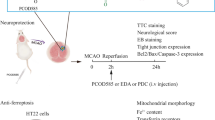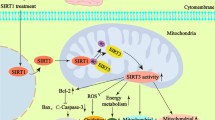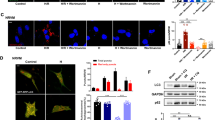Abstract
Oxidative stress and apoptosis are the key factors that limit the hypothermic preservation time of donor hearts to within 4–6 h. The aim of this study was to investigate whether the histone deacetylase 3 (HDAC3) inhibitor RGFP966 could protect against cardiac injury induced by prolonged hypothermic preservation. Rat hearts were hypothermically preserved in Celsior solution with or without RGFP966 for 12 h followed by 60 min of reperfusion. Hemodynamic parameters during reperfusion were evaluated. The expression and phosphorylation levels of mammalian STE20-like kinase-1 (Mst1) and Yes-associated protein (YAP) were determined by western blotting. Cell apoptosis was measured by the terminal deoxynucleotidyl-transferase (TdT)-mediated dUTP nick-end labeling (TUNEL) method. Addition of RGFP966 in Celsior solution significantly inhibited cardiac dysfunction induced by hypothermic preservation. RGFP966 inhibited the hypothermic preservation-induced increase of the phosphorylated (p)-Mst1/Mst1 and p-YAP/YAP ratios, prevented a reduction in total YAP protein expression, and increased the nuclear YAP protein level. Verteporfin (VP), a small molecular inhibitor of YAP-transcriptional enhanced associate domain (TEAD) interaction, partially abolished the protective effect of RGFP966 on cardiac function, and reduced lactate dehydrogenase activity and malondialdehyde content. RGFP966 increased superoxide dismutase, catalase, and glutathione peroxidase gene and protein expression, which was abolished by VP. RGFP966 inhibited hypothermic preservation-induced overexpression of B-cell lymphoma protein 2 (Bcl-2)-associated X (Bax) and cleaved caspase-3, increased Bcl-2 mRNA and protein expression, and reduced cardiomyocyte apoptosis. The antioxidant and anti-apoptotic effects of RGFP966 were cancelled by VP. The results suggest that supplementation of Celsior solution with RGFP966 attenuated prolonged hypothermic preservation-induced cardiac dysfunction. The mechanism may involve inhibition of oxidative stress and apoptosis via inactivation of the YAP pathway.
概要
目的
观察组蛋白脱乙酰化酶 3(HDAC3) 抑制剂 RGFP966 是否能够促进低温保存心脏复灌期心功能的恢复, 并探讨 Hippo-YAP 信号通路是否参与了 RGFP966 的心肌保护作用.
创新点
首次证实了在 Celsior 保存液中添加 RGFP966 可以减轻长时程低温保存引起的心脏功能障碍. 该研究结果为临床实践中的心脏移植提供有价值且可行的策略, 为患者获得远距供体心脏提供了可能.
方法
将大鼠离体心脏置于含有或不含有 RGFP966 的 Celsior 保存液中低温保存 12h 后, 于 Langendorff 灌流系统中复灌 60min, 测定复灌期各项心功能指标. 用 Western blotting 法分析 Mst1 和 YAP 蛋白表达和磷酸化水平. 用 TUNEL 法测定心肌细胞凋亡情况.
结论
RGFP966 可以促进低温保存心脏复灌期心功能的恢复, 其作用机制可能是通过抑制 Hippo-YAP 信号传导通路的激活, 增强心肌抗氧化能力, 抑制心肌细胞凋亡而实现的.
Similar content being viewed by others
References
An PP, Li JX, Lu LL, et al., 2019. Histone deacetylase 8 triggers the migration of triple negative breast cancer cells via regulation of YAP signals. Eur J Pharmacol, 845:16–23. https://doi.org/10.1016/j.ejphar.2018.12.030
Aune SE, Herr DJ, Mani SK, et al., 2014. Selective inhibition of class I but not class IIb histone deacetylases exerts cardiac protection from ischemia reperfusion. J Mol Cell Cardiol, 72:138–145. https://doi.org/10.1016/j.yjmcc.2014.03.005
Brundel BJJM, Li J, Zhang DL, 2020. Role of HDACs in cardiac electropathology: therapeutic implications for atrial fibrillation. Biochim Biophys Acta Mol Cell Res, 1867(3):118459. https://doi.org/10.1016/j.bbamcr.2019.03.006
Chen BY, Jiang LX, Hao K, et al., 2018. Protection of plasma transfusion against lipopolysaccharide/d-galactosamine-induced fulminant hepatic failure through inhibiting apoptosis of hepatic cells in mice. J Zhejiang Univ-Sci B (Biomed & Biotechnol), 19(6):436–444. https://doi.org/10.1631/jzus.B1700277
Chen GG, Yan JB, Wang XM, et al., 2016. Mechanism of uncoupling protein 2-mediated myocardial injury in hypothermic preserved rat hearts. Mol Med Rep, 14(2):1857–1864. https://doi.org/10.3892/mmr.2016.5436
Chen ML, Liu Q, Chen LJ, et al., 2017. Remifentanil postconditioning ameliorates histone H3 acetylation modification in H9c2 cardiomyoblasts after hypoxia/reoxygenation via attenuating endoplasmic reticulum stress. Apoptosis, 22(5):662–671. https://doi.org/10.1007/s10495-017-1347-5
Ferguson BS, McKinsey TA, 2015. Non-sirtuin histone deacetylases in the control of cardiac aging. J Mol Cell Cardiol, 83:14–20. https://doi.org/10.1016/j.yjmcc.2015.03.010
Fu PF, Zheng X, Fan X, et al., 2019. Role of cytoplasmic lncRNAs in regulating cancer signaling pathways. J Zhejiang Univ-Sci B (Biomed & Biotechnol), 20(1):1–8. https://doi.org/10.1631/jzus.B1800254
Hamlin RL, del Rio C, 2012. dP/dtmax—a measure of ‘baroinometry’. J Pharmacol Toxicol Methods, 66(2):63–65. https://doi.org/10.1016/j.vascn.2012.01.001
Hitchcock LN, Raybuck JD, Wood MA, et al., 2019. Effects of a histone deacetylase 3 inhibitor on extinction and reinstatement of cocaine self-administration in rats. Psycho-pharmacology, 236(1):517–529. https://doi.org/10.1007/s00213-018-5122-2
Janczura KJ, Volmar CH, Sartor GC, et al., 2018. Inhibition of HDAC3 reverses Alzheimer’s disease-related pathologies in vitro and in the 3xTg-AD mouse model. Proc Natl Acad Sci USA, 115(47):E11148–E11157. https://doi.org/10.1073/pnas.1805436115
Jia LL, Gu WT, Zhang YP, et al., 2018. Activated Yes-associated protein accelerates cell cycle, inhibits apoptosis, and delays senescence in human periodontal ligament stem cells. Int J Med Sci, 15(11):1241–1250. https://doi.org/10.7150/ijms.25115
Joshi AD, Barabutis N, Birmpas C, et al., 2015. Histone deacetylase inhibitors prevent pulmonary endothelial hyperpermeability and acute lung injury by regulating heat shock protein 90 function. Am J Physiol Lung Cell Mol Physiol, 309(12):L1410–L1419. https://doi.org/10.1152/ajplung.00180.2015
Jung DE, Park SB, Kim K, et al., 2017. CG200745, an HDAC inhibitor, induces anti-tumour effects in cholangiocarcinoma cell lines via miRNAs targeting the Hippo pathway. Sci Rep, 7:10921. https://doi.org/10.1038/s41598-017-11094-3
Kavitha S, Chandra TS, 2014. Oxidative stress protection and glutathione metabolism in response to hydrogen peroxide and menadione in riboflavinogenic fungus Ashbya gossypii. Appl Biochem Biotechnol, 174(6):2307–2325. https://doi.org/10.1007/s12010-014-1188-4
Korkmaz-Icöz S, Li SL, Huttner R, et al., 2019. Hypothermic perfusion of donor heart with a preservation solution supplemented by mesenchymal stem cells. J Heart Lung Transplant, 38(3):315–326. https://doi.org/10.1016/j.healun.2018.12.003
Lerman DA, Diaz M, Peault B, 2018. Changes in coexpression of pericytes and endogenous cardiac progenitor cells from heart development to disease state. Eur Heart J, 39(S1):P1850. https://doi.org/10.1093/eurheartj/ehy565.P1850
Lewandowski SL, Janardhan HP, Trivedi CM, 2015. Histone deacetylase 3 coordinates deacetylase-independent epigenetic silencing of transforming growth factor-β1 (TGF-β1) to orchestrate second heart field development. J Biol Chem, 290(45):27067–27089. https://doi.org/10.1074/jbc.M115.684753
Li H, Li XJ, Jing XZ, et al., 2018. Hypoxia promotes maintenance of the chondrogenic phenotype in rat growth plate chondrocytes through the HIF-1α/YAP signaling pathway. Int J Mol Med, 42(6):3181–3192. https://doi.org/10.3892/ijmm.2018.3921
Lkhagva B, Lin YK, Kao YH, et al., 2015. Novel histone deacetylase inhibitor modulates cardiac peroxisome proliferator-activated receptors and inflammatory cytokines in heart failure. Pharmacology, 96(3–4):184–191. https://doi.org/10.1159/000438864
Malvaez M, McQuown SC, Rogge GA, et al., 2013. HDAC3-selective inhibitor enhances extinction of cocaine-seeking behavior in a persistent manner. Proc Natl Acad Sci USA, 110(7):2647–2652. https://doi.org/10.1073/pnas.1213364110
McKinsey TA, 2012. Therapeutic potential for HDAC inhibitors in the heart. Annu Rev Pharmacol Toxicol, 52:303–319. https://doi.org/10.1146/annurev-pharmtox-010611-134712
Mehra MR, Canter CE, Hannan MM, et al., 2016. The 2016 international society for heart lung transplantation listing criteria for heart transplantation: a 10-year update. J Heart Lung Transplant, 35(1):1–23. https://doi.org/10.1016/j.healun.2015.10.023
Morioka N, Tomori M, Zhang FF, et al., 2016. Stimulation of nuclear receptor REV-ERBs regulates tumor necrosis factor-induced expression of proinflammatory molecules in C6 astroglial cells. Biochem Biophys Res Commun, 469(2):151–157. https://doi.org/10.1016/j.bbrc.2015.11.086
Nakamura M, Zhai PY, del Re DP, et al., 2016. Mst1-mediated phosphorylation of Bcl-xL is required for myocardial reperfusion injury. JCI Insight, 1(5):e86217. https://doi.org/10.1172/jci.insight.86217
Olson DE, Sleiman SF, Bourassa MW, et al., 2015. Hydroxamate-based histone deacetylase inhibitors can protect neurons from oxidative stress via a histone deacetylase-independent catalase-like mechanism. Chem Biol, 22(4):439–445. https://doi.org/10.1016/j.chembiol.2015.03.014
Plouffe SW, Lin KC, Moore JL 3rd, et al., 2018. The Hippo pathway effector proteins YAP and TAZ have both distinct and overlapping functions in the cell. J Biol Chem, 293(28):11230–11240. https://doi.org/10.1074/jbc.RA118.002715
Poleshko A, Shah PP, Gupta M, et al., 2017. Genome-nuclear lamina interactions regulate cardiac stem cell lineage restriction. Cell, 171(3):573–587.e14. https://doi.org/10.1016/j.cell.2017.09.018
Ren WB, Xia XJ, Huang J, et al., 2019. Interferon-γ regulates cell malignant growth via the c-Abl/HDAC2 signaling pathway in mammary epithelial cells. J Zhejiang Univ-Sci B (Biomed & Biotechnol), 20(1):39–48. https://doi.org/10.1631/jzus.B1800211
Rivera-Reyes A, Ye S, Marino GE, et al., 2018. YAP1 enhances NF-κB-dependent and independent effects on clock-mediated unfolded protein responses and autophagy in sarcoma. Cell Death Dis, 9(11):1108. https://doi.org/10.1038/s41419-018-1142-4
Roy A, Lordier L, Pioche-Durieu C, et al., 2016. Uncoupling of the Hippo and Rho pathways allows megakaryocytes to escape the tetraploid checkpoint. Haematologica, 101(12):1469–1478. https://doi.org/10.3324/haematol.2016.149914
Ryu Y, Kee HJ, Sun SM, et al., 2019. Class I histone deacetylase inhibitor MS-275 attenuates vasoconstriction and inflammation in angiotensin II-induced hypertension. PLoS ONE, 14(3):e0213186. https://doi.org/10.1371/journal.pone.0213186
Schmitt HM, Schlamp CL, Nickells RW, 2018. Targeting HDAC3 activity with RGFP966 protects against retinal ganglion cell nuclear atrophy and apoptosis after optic nerve injury. J Ocul Pharmacol Ther, 34(3):260–273. https://doi.org/10.1089/jop.2017.0059
Shao D, Zhai PY, del Re DP, et al., 2014. A functional interaction between Hippo-YAP signalling and FoxO1 mediates the oxidative stress response. Nat Commun, 5(1):3315. https://doi.org/10.1038/ncomms4315
Sharifi-Sanjani M, Shoushtari AH, Quiroz M, et al., 2014. Cardiac CD47 drives left ventricular heart failure through Ca2+-CaMKII-regulated induction of HDAC3. J Am Heart Assoc, 3(3):e000670. https://doi.org/10.1161/JAHA.113.000670
Sun Z, Feng D, Fang B, et al., 2013. Deacetylase-independent function of HDAC3 in transcription and metabolism requires nuclear receptor corepressor. Mol Cell, 52(6):769–782. https://doi.org/10.1016/j.molcel.2013.10.022
Wang J, Liu SJ, Heallen T, et al., 2018. The Hippo pathway in the heart: pivotal roles in development, disease, and regeneration. Nat Rev Cardiol, 15(11):672–684. https://doi.org/10.1038/s41569-018-0063-3
Xu Z, Tong Q, Zhang ZG, et al., 2017. Inhibition of HDAC3 prevents diabetic cardiomyopathy in OVE26 mice via epigenetic regulation of DUSP5-ERK1/2 pathway. Clin Sci (Lond), 131(15):1841–1857. https://doi.org/10.1042/CS20170064
Yu LJ, Liu Y, Jin YXZ, et al., 2018. Lentivirus-mediated HDAC3 inhibition attenuates oxidative stress in APPswe/PS1dE9 mice. J Alzheimers Dis, 61(4):1411–1424. https://doi.org/10.3233/JAD-170844
Zhang DL, Hu X, Li J, et al., 2018. Converse role of class I and class IIa HDACs in the progression of atrial fibrillation. J Mol Cell Cardiol, 125:39–49. https://doi.org/10.1016/j.yjmcc.2018.09.010
Zhang H, Geng DC, Gao J, et al., 2016. Expression and significance of Hippo/YAP signaling in glioma progression. Tumor Biol, 37(12):15665–15676. https://doi.org/10.1007/s13277-016-5318-1
Zhang J, Xu Z, Gu JL, et al., 2018. HDAC3 inhibition in diabetic mice may activate Nrf2 preventing diabetes-induced liver damage and FGF21 synthesis and secretion leading to aortic protection. Am J Physiol Endocrinol Metab, 315(2):E150–E162. https://doi.org/10.1152/ajpendo.00465.2017
Zhao B, Yuan Q, Hou JB, et al., 2019. Inhibition of HDAC3 ameliorates cerebral ischemia reperfusion injury in diabetic mice in vivo and in vitro. J Diabetes Res, 2019:8520856. https://doi.org/10.1155/2019/8520856
Author information
Authors and Affiliations
Contributions
Xiao-he ZHENG, Lin-lin WANG, Ming-zhi ZHENG, and Jin-jie ZHONG performed the experimental research and data analysis, wrote and edited the manuscript. Ying-ying CHEN and Yue-liang SHEN contributed to the study design, data analysis, writing and editing of the manuscript. All authors have read and approved the final manuscript and, therefore, have full access to all the data in the study and take responsibility for the integrity and security of the data.
Corresponding authors
Additional information
Compliance with ethics guidelines
Xiao-he ZHENG, Lin-lin WANG, Ming-zhi ZHENG, Jin-jie ZHONG, Ying-ying CHEN, and Yue-liang SHEN declare that they have no conflict of interest.
The research was conducted in accordance with the Declaration of Helsinki and/or with the Guide for the Care and Use of Laboratory Animals as adopted and promulgated by the United States National Institutes of Health. All experiments were approved by the Ethics Committee on Animal Experimentation of Zhejiang University (Hangzhou, China).
Project supported by the National Natural Science Foundation of China (No. 81871541)
Rights and permissions
About this article
Cite this article
Zheng, Xh., Wang, Ll., Zheng, Mz. et al. RGFP966 inactivation of the YAP pathway attenuates cardiac dysfunction induced by prolonged hypothermic preservation. J. Zhejiang Univ. Sci. B 21, 703–715 (2020). https://doi.org/10.1631/jzus.B2000026
Received:
Accepted:
Published:
Issue Date:
DOI: https://doi.org/10.1631/jzus.B2000026




